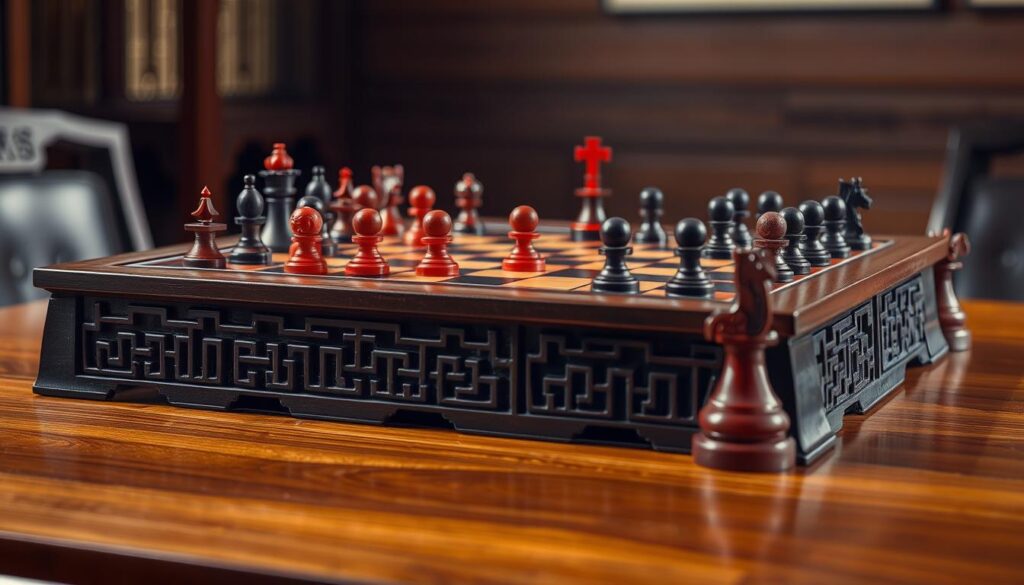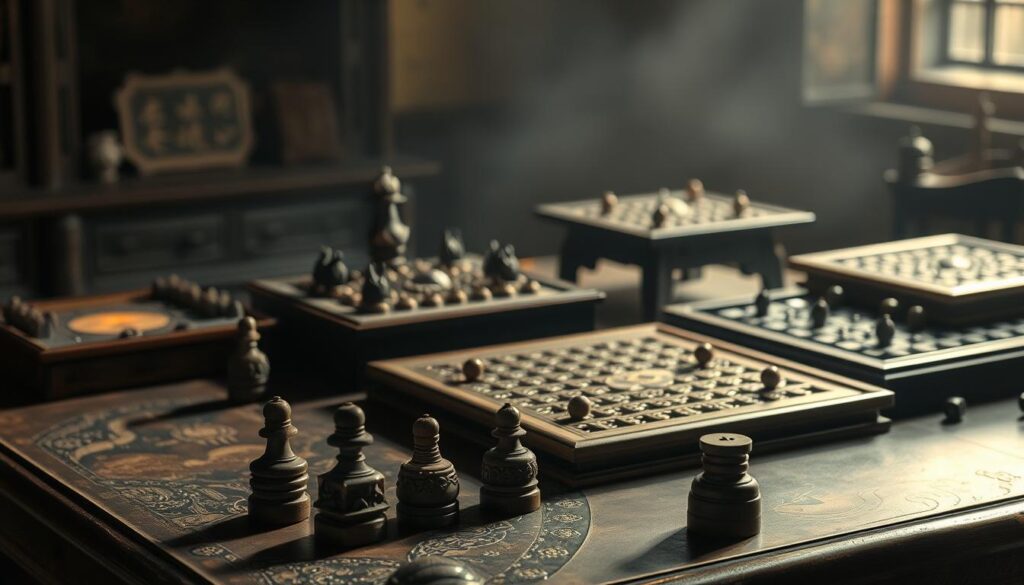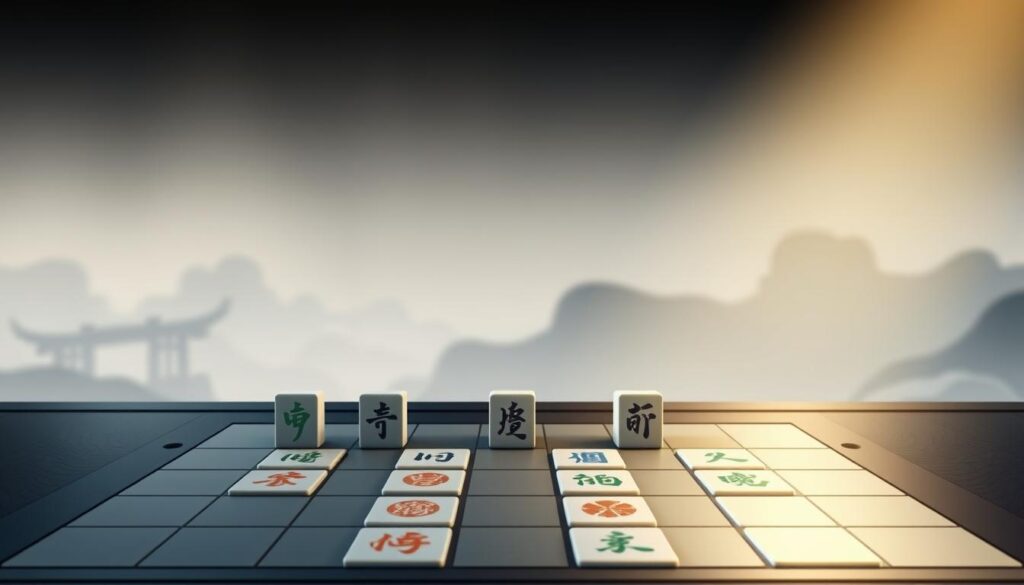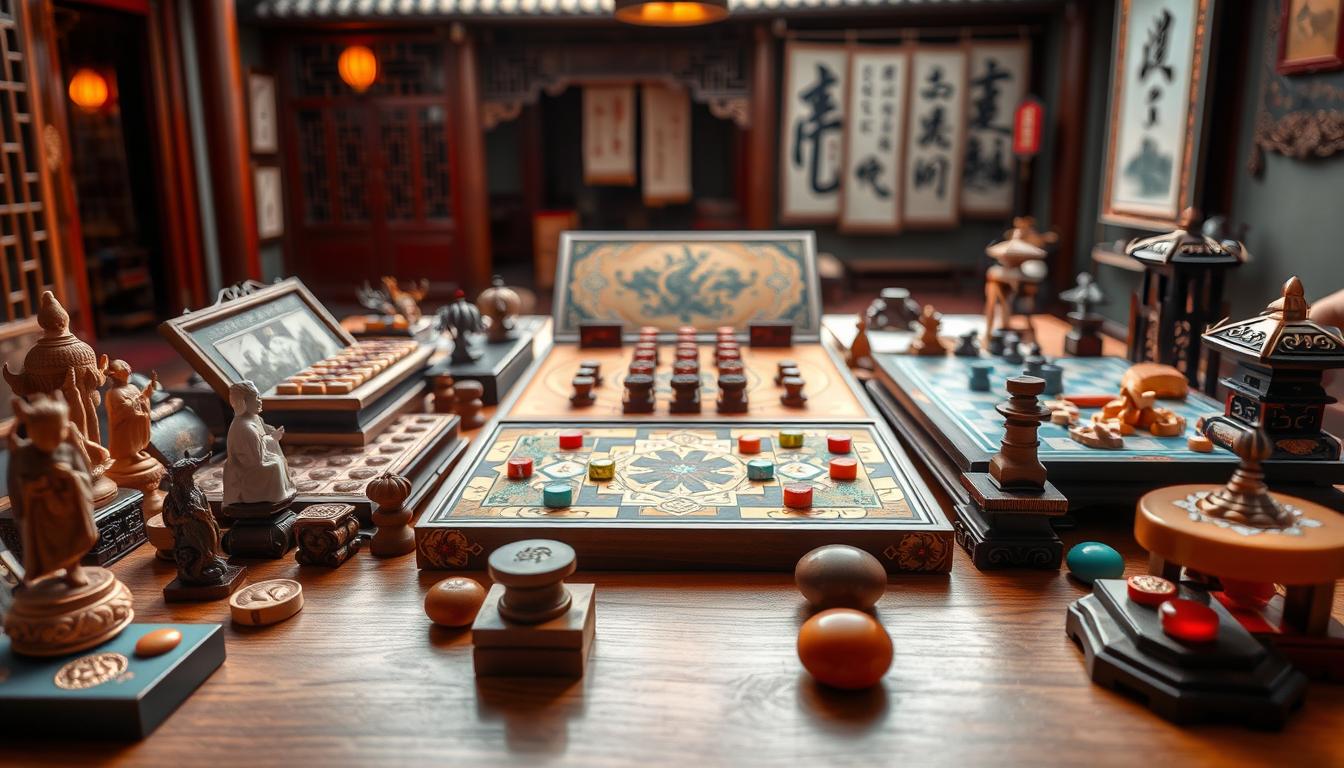Chinese board games open a world of strategic thinking and cultural heritage, captivating players globally. These traditional games are more than entertainment; they offer a glimpse into centuries of intellectual challenge and social interaction.
Games like Mahjong, Go, and Xiangqi showcase remarkable complexity and skill. Players uncover unique gameplay mechanics that challenge mental agility and strategic planning. Western games rarely match this level of complexity.
Each game holds deep historical significance, reflecting philosophical principles and strategic thinking developed over generations. Today, modern enthusiasts can explore these rich gaming traditions through accessible platforms and global gaming communities.
Key Takeaways
- Chinese board games blend cultural heritage with strategic complexity
- Games like Mahjong and Go offer unique intellectual challenges
- Traditional games continue to influence modern gaming experiences
- Learning these games provides insight into Chinese cultural thinking
- Global interest in Chinese board games is rapidly growing
Understanding the Rich Heritage of Chinese Board Games
Old Chinese board games offer a captivating glimpse into a culture that cherishes strategy, wisdom, and social bonding. These ancient games have endured for millennia, evolving from simple diversions into profound cultural symbols. They unveil deep philosophical truths.
The origins of these games trace back to dynasties where intellectual endeavors were highly esteemed. These games served as more than mere entertainment. They were vital tools for cultivating critical thinking and social skills.
Ancient Origins and Cultural Significance
Ancient Chinese board games transcended mere leisure activities. They encapsulated profound philosophical ideas, mirroring societal values and strategic acumen. Through complex gameplay, players absorbed vital life lessons.
- Developed during the Zhou Dynasty (1046-256 BCE)
- Integrated philosophical principles from Confucianism and Taoism
- Used as educational tools for nobility and scholars
The Evolution of Traditional Games in Modern Times
Traditional Chinese board games have seamlessly transitioned into the modern gaming scene. Digital platforms and global tournaments have revitalized these centuries-old designs. They have introduced these games to a worldwide audience.
Impact on Global Gaming Culture
Chinese board games have profoundly shaped global gaming strategies. Games like Go and Xiangqi have inspired designers worldwide. They showcase the intellectual depth and complexity of Chinese gaming traditions.
“Games are windows into cultural intelligence” – Traditional Chinese Proverb
The lasting impact of these games highlights their universal appeal. They connect generations and cultures through shared intellectual pursuits and enjoyment.
Mahjong: The Classic Chinese Tile Game
Mahjong is a legendary Chinese board game of matching tiles, captivating players globally for generations. It combines strategy, skill, and social interaction, creating a rich experience beyond mere entertainment.
The game uses 144 unique tiles, adorned with Chinese characters, symbols, and designs. Players aim to create specific tile combinations while strategically removing tiles. Mastering the basic rules turns this game into a compelling challenge.
- Requires 4 players
- Uses specialized rectangular tiles
- Combines luck and strategic thinking
- Deeply rooted in Chinese cultural traditions
Mahjong’s complexity elevates it beyond a simple game. It’s a social ritual that connects generations, fostering interaction, communication, and shared experiences. Traditional groups often congregate around Mahjong tables during family gatherings or community events.
“Mahjong is not just about winning, but about the journey of play and connection” – Traditional Chinese Proverb
Modern technology has redefined this classic game. Digital platforms now offer online versions, enabling enthusiasts to compete with players worldwide. These digital adaptations preserve the game’s essence, making it accessible to new players.
Go (Weiqi): Strategy and Wisdom Combined
Go, also known as Weiqi in Chinese, is a cherished game among enthusiasts. It’s more than just a board game; it’s a deep dive into strategy and spatial thinking. This ancient game offers a unique philosophical approach to competition.
The game pits two players against each other, using black and white stones on a grid. It’s a mesmerizing display of strategic placement. The goal is to control more territory by surrounding your opponent’s stones and creating complex networks.
Basic Rules and Gameplay Mechanics
Go’s rules seem simple but are incredibly complex. Players take turns placing stones on a grid, aiming for several key objectives. These include:
- Surrounding empty areas
- Capturing opponent’s stones
- Maintaining strategic board control
Advanced Strategies for Success
To master Go, one must grasp advanced strategic concepts. Top players employ techniques like:
- Positional reading
- Long-term territorial planning
- Psychological opponent analysis
Modern Tournaments and Professional Play
Professional Go has seen a significant shift with the advent of artificial intelligence. Today’s tournaments showcase incredible talent, blending traditional strategies with modern technology.
| Tournament | Location | Prize Money |
|---|---|---|
| World Go Championship | Japan | $100,000 |
| Chinese Weiqi Championship | Beijing | $75,000 |
| AlphaGo Challenge | Global | Prestige |
Go remains a global phenomenon, captivating players with its blend of intellectual challenge and cultural heritage.
Chinese Chess (Xiangqi): The Game of Generals

Xiangqi, or Chinese chess, is a captivating board game deeply rooted in Chinese culture. Played for centuries, it offers a complex battlefield for tactical decision-making. This game is a testament to the strategic prowess of its players.
The game is played on a unique 9×10 grid board, unlike Western chess. Players control two armies, each with distinct pieces representing military units. The goal is to capture the opponent’s general while safeguarding your own.
- Played on a specialized rectangular board
- Includes seven unique piece types
- Requires intense strategic thinking
- Deeply rooted in Chinese military history
Key pieces in Xiangqi include the general, advisors, elephants, horses, chariots, cannons, and soldiers. Each piece moves differently, creating a complex web of possible moves and counterstrategies.
| Piece | Movement | Strategic Value |
|---|---|---|
| General | Restricted to palace area | Critical – game ends if captured |
| Cannon | Must jump over another piece to capture | Unique attacking mechanism |
| Horse | Similar to chess knight | Flexible movement |
Modern Xiangqi tournaments draw thousands of players from China and abroad. The game continues to evolve, merging traditional board games with contemporary competitive gaming.
“Xiangqi is not just a game, but a reflection of strategic thinking and military philosophy.” – Chinese Chess Master
Chinese Checkers: A Family Favorite
Chinese Checkers has become a beloved staple among chinese board games, captivating players of all ages with its simple yet engaging gameplay. Despite its name, the game actually originated in Germany and gained worldwide popularity as an entertaining family activity.
Players looking to explore exciting chinese board games will find Chinese Checkers an excellent choice for social gatherings and family game nights. The colorful star-shaped board and unique marble movement create a dynamic and strategic experience.
Setting Up the Game Board
Preparing for a game of Chinese Checkers involves a few straightforward steps:
- Place the star-shaped board on a flat surface
- Distribute 10 marbles of one color to each player
- Position marbles in the triangular corner opposite your starting point
- Determine the playing order randomly
Winning Tactics and Common Mistakes
Successful players of chinese board games like Chinese Checkers understand key strategic approaches:
- Focus on creating continuous jumping chains
- Block opponent’s moves
- Spread marbles across the board early
- Avoid clustering marbles in a single area
Variations and House Rules
Many families develop unique twists to traditional chinese board games. Some popular Chinese Checkers variations include:
- Faster gameplay with reduced marble count
- Team-based strategic modes
- Handicap rules for mixed-skill groups
- Timed move restrictions
Whether you’re a seasoned player or new to chinese board games, Chinese Checkers offers an accessible and enjoyable experience for everyone.
Essential Chinese Board Games for Beginners

Exploring old chinese board games is an exciting journey for newcomers. It introduces them to traditional gaming experiences. Classic games serve as perfect entry points for beginners, allowing them to dive into this rich cultural tradition.
For those starting their adventure, several options offer accessible and engaging gameplay:
- Liubo: An ancient race game with simple rules that showcase early Chinese gaming culture
- Chinese Checkers: A family-friendly game with straightforward mechanics
- Simplified Mahjong: A beginner-friendly version of the classic tile game
Beginners should consider several factors when selecting their first old chinese board games:
- Complexity of rules
- Play time duration
- Number of players required
- Cultural significance
The best introductory games have clear objectives, minimal equipment, and quick learning curves. Novice players can build confidence by starting with less complicated options. This allows them to progress to more strategic challenges.
Discovering old chinese board games is like opening a window into centuries of cultural tradition and strategic thinking.
Newcomers will find that many traditional Chinese board games offer more than just entertainment. They provide insights into strategic thinking, cultural heritage, and social interactions. These elements have shaped Chinese gaming traditions for generations.
Traditional Game Pieces and Materials
Board games in Chinese culture are more than just entertainment. They are exquisite works of art, reflecting centuries of craftsmanship and cultural heritage. The materials and design of traditional board game sets highlight deep artistic traditions and meticulous attention to detail.
Craftsmanship and Artistry
Chinese board game sets stand out for their exceptional craftsmanship. Artisans use high-quality materials such as:
- Carved wooden boards with detailed designs
- Jade and porcelain game pieces
- Hand-painted tiles with traditional motifs
- Delicate bone and ivory components (historically)
Caring for Your Game Sets
Preserving board games in Chinese collections demands careful maintenance. Proper storage and handling are essential to keep these precious game sets in top condition.
- Store in cool, dry environments
- Use soft cloths for cleaning
- Avoid direct sunlight
- Handle pieces with clean hands
Where to Find Authentic Equipment
Collectors and enthusiasts can find authentic board games in Chinese styles through specialized retailers, antique shops, and online marketplaces focused on traditional gaming artifacts.
Each game piece tells a story of cultural heritage and artistic expression.
Modern Adaptations of Classic Chinese Board Games

The realm of Chinese board games has seen a significant digital evolution. Classics like Mahjong, the cherished chinese board game of matching tiles, have been reborn in the digital world. This rebirth has drawn in a new generation of players and fans from around the globe.
Digital platforms have transformed the way we engage with these classic games. Apps on smartphones and online gaming sites now offer deep, immersive experiences. They keep the strategic essence of traditional games alive while making them more user-friendly.
- Mobile versions of Mahjong with stunning graphics
- Online multiplayer platforms for Go and Chinese Chess
- Virtual tournaments connecting players globally
Game designers have also crafted innovative hybrid versions. These versions combine traditional gameplay with modern twists. Weiqi (Go) is a prime example, with AI training modes and interactive tutorials that help beginners grasp complex strategies.
The digital transformation of these games has not only safeguarded cultural heritage. It has also introduced these timeless classics to a worldwide audience. Virtual adaptations ensure that the rich traditions of Chinese board games endure well into the 21st century.
Where to Learn and Play Chinese Board Games Online
The digital world has changed how we play traditional Chinese board games. Now, technology connects us across the globe. This lets fans explore chinese board games black white platforms from anywhere.
Digital Gaming Platforms
Players can find exciting online spots for classic Chinese board games:
- Board Game Arena – Offers multiple Chinese strategy games
- Pandanet – Specializes in Go (Weiqi) gameplay
- Global Xiangqi – Dedicated to Chinese Chess online
- Mahjong Soul – Popular digital Mahjong platform
Online Communities and Learning Resources
Connecting with others makes gaming better. Many strong online communities offer great insights:
- Reddit’s r/ChineseBoardGames subreddit
- BoardGameGeek Chinese Games Forum
- Discord channels dedicated to strategy games
- YouTube channels featuring game tutorials
Virtual Tournaments and Events
Competitive players can join many online tournaments. These digital events showcase skills in chinese board games black white competitions. They connect players worldwide and offer thrilling challenges.
“Online platforms have revolutionized traditional gaming, making cultural experiences accessible worldwide.”
Conclusion
Chinese board games offer a captivating journey through cultural heritage and strategic gameplay. Games like Mahjong and Go showcase more than just fun. They open a window into centuries of Chinese intellectual tradition, pushing players to enhance their critical thinking and cultural understanding.
The variety of Chinese board games caters to all types of players. Whether you’re looking for a family-friendly game or a complex challenge, there’s something for everyone. These games provide unique experiences that go beyond the usual board game interactions. They allow players to explore ancient wisdom while enjoying engaging gameplay that has stood the test of time.
Exploring Chinese board games introduces a world of social connection and intellectual growth. Both newcomers and seasoned gamers can discover these remarkable games through online platforms, local groups, and digital communities. It’s an invitation to dive into this vibrant gaming tradition, learn new skills, and connect with a global community passionate about these timeless games.
Beginners can start with simpler games like Chinese Checkers, while those seeking deeper challenges might explore Xiangqi or advanced Mahjong strategies. The journey of learning these games is as rewarding as the gameplay itself. It promises endless hours of enjoyment, mental stimulation, and cultural appreciation.



